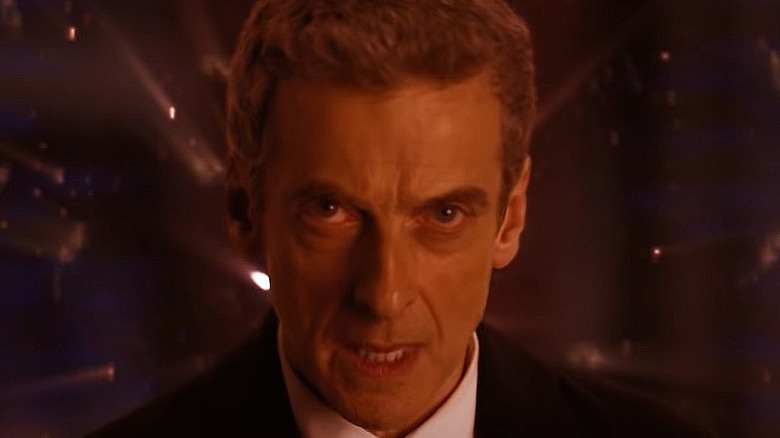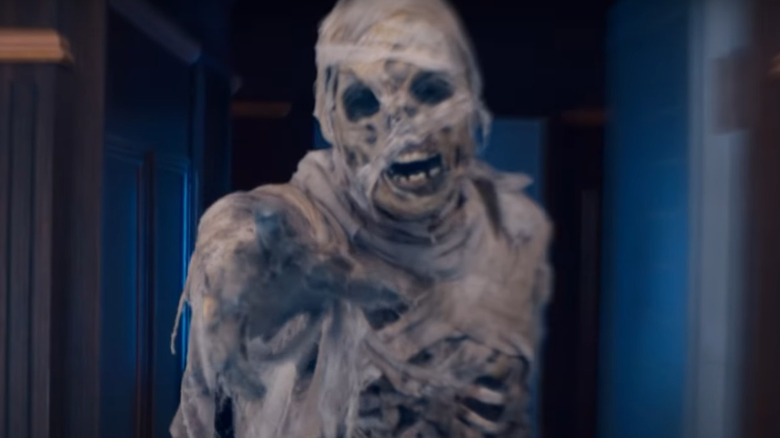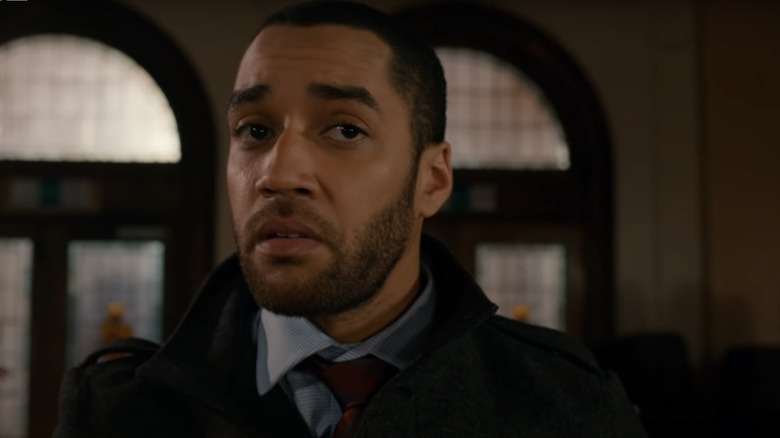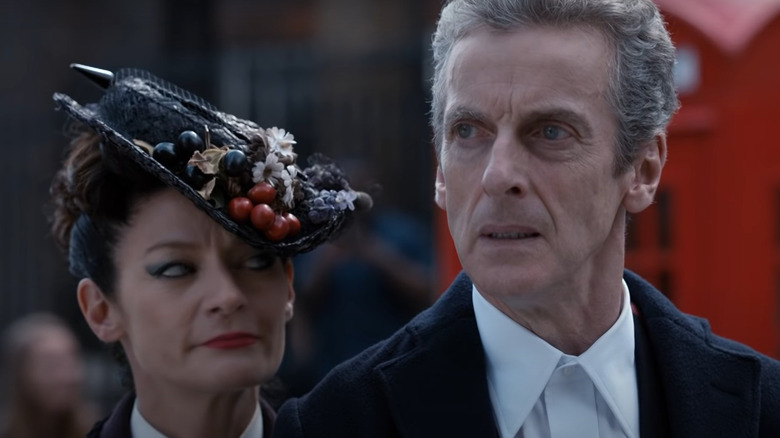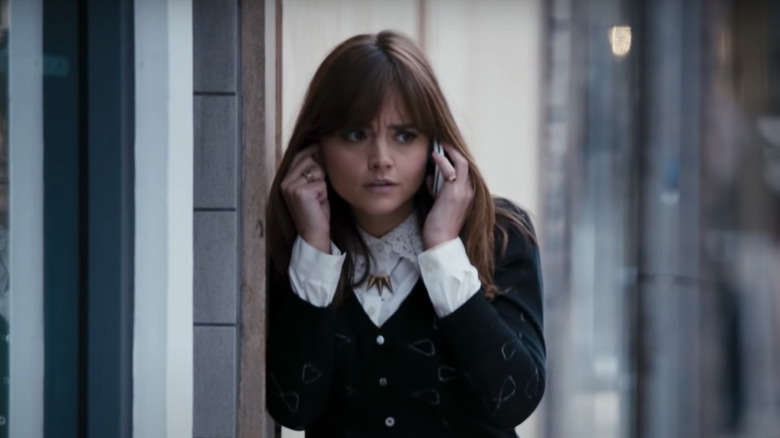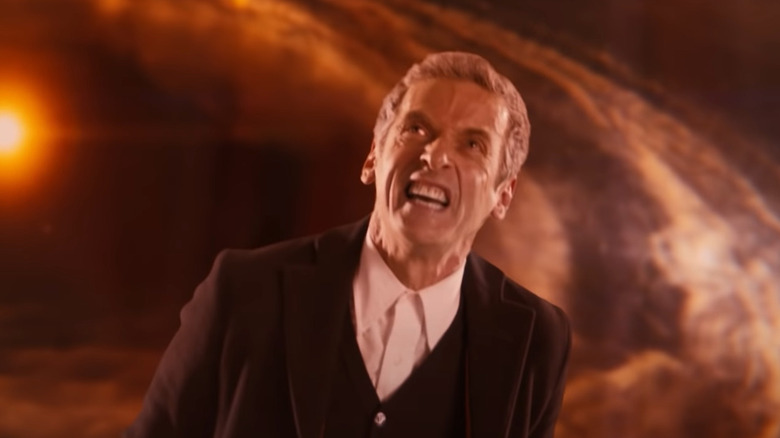The Ending Of Doctor Who Season 8 Explained
BBC's science fiction series "Doctor Who" follows the Doctor, a time-traveling demigod with a deep fondness for humanity. For the uninitiated, there are two primary conceits that can make viewing the Doctor's adventures a little difficult to follow. First, "Doctor Who" uses time travel not only to journey to the far reaches of imagination but to loop back on itself, as well, thus creating new variations of otherwise canonically established events. Secondly, the Doctor is a Time Lord, which is a fancy sci-fi exposition term that means that they can regenerate into a new body when the need arises, thereby becoming an entirely new person who's portrayed by an entirely new actor.
With these two facets in conjunction, "Doctor Who" is primed to continue creating new content long after the inevitable heat death of the universe. To aid in the mental digestion, here's an analysis of the events that occur during Season 8 of the wildly popular 2005 reboot of the series, which focuses on the Twelfth Doctor (Peter Capaldi) and his flighty companion, Clara Oswald (Jenna Coleman).
A quick space opera refresher course
Let's set the scene so that everyone is working with the same framework of information. At the end of Season 7, the Eleventh Doctor (Matt Smith) regenerated into the Twelfth Doctor after a long battle on the alien planet Trenzalore, where it was prophesied that he would die (he did, sort of, but only briefly, it's complicated). For Season 8, the newer, far older face of the Doctor can be seen maintaining business as usual by traveling aimlessly, simply for the thrill of it.
He is often accompanied by Clara Oswald, whom he inherited as a companion from his previous regeneration, and sometimes by Danny Pink (Samuel Anderson), Clara's potential romantic interest who vehemently disapproves of the Doctor. The duo/trio encounters Daleks, space mummies, and the "real" Robin Hood of Locksley (Tom Riley). As with every season, there are scattered hints of mystery that build toward a larger finale, and this time around, the breadcrumbs lead allegedly to Heaven, with every character who dies finding themselves welcomed into the afterlife by a heretofore unknown woman. This is "Doctor Who," though, and no such happy endings exist.
Danny Pink got the short end of the stick
Danny Pink is a war vet who believes Clara Oswald, whom he dearly loves, shouldn't travel with the Doctor because the Doctor is, essentially, a war general. He's kind, yet stern, and insists upon truthful communication in all things. His purpose is to provide an opposing life route for Clara, but the choice is taken from her when Danny gets hit by a car in the penultimate episode of the season. Now, there is an unfortunate tendency in "Doctor Who" — which is indicative of a larger trend in serialized media — to create characters for the sole purpose of killing them off.
Yes, every story should absolutely prove that choices have actionable consequences, but it's usually pretty obvious when a character is introduced for the sole purpose of providing a future emotional beat for another character by being killed off. And when it's so painfully clear like it was with Danny, who never received genuine growth, it entirely negates the dramatic effect of fridging them in the first place. The worst part of this whole mess is that Samuel Anderson made Danny incredibly compelling, which made his character's unsurprising death viscerally frustrating. Anderson – and Pink – deserve better.
Missy is the new Master because death is irrelevant
In "Doctor Who" Season 3, the Tenth Doctor (David Tennent) saw the Master (John Simm), a rival Time Lord and certified sociopathic serial killer, die. He also cremated the body, both out of respect and as a preventative measure, as the Master has an annoying tendency to not stay dead. Season 8 of the sci-fi series reveals that the mysterious woman who has been welcoming people into "Heaven" is in fact the newest regeneration of the Master, or Missy (Michelle Gomez), as she prefers to be titled.
Missy is every bit as chaotic as the Master was before and gives further weight to the theory that the "Doctor Who" 2005 reboot wanted its own version of the Joker or, more specifically, a nemesis that the protagonist refuses to kill, thereby ensuring untold — but guaranteed — damage to innocent lives for many seasons to come. Once again, Missy is "killed" after her plans go awry, but she, once again, is actually perfectly fine. Plot predictability aside, Missy is notable for being the first female regeneration for an otherwise male character in "Doctor Who" lore. She sets a precedent that a certain other Time Lord will build upon later down the road.
Clara Oswald makes up her mind to not make up her mind
It is perhaps unfair to accuse "Doctor Who" of retreading frequented plots as if that weren't the entire point, but Season 8 struggles to break free from a rut of its own design, a burden that the actors carry with impressive skill. For Clara Oswald, the rut is a single question that is repeated in every episode: Will she stay by the new Doctor's side, or will she return to a normal life? Clara clearly yearns for adventure but is hung up on the Twelfth Doctor's drastic change from his prior regeneration. To make her choice more difficult, Danny Pink is the "prize" available to her should she choose to live a human life — a safe life.
Seriously, from the moment the question is posed, the arc stutters to a halt while Clara avoids answering it. She goes out of her way to lie to everyone she cares about to prevent answering that question. While indecision is relatable on its own merits, it feels as if the BBC was unsure of what to do with the Impossible Girl after she became, well, Possible. Though not relevant yet, Clara would go on to receive a more fitting and varied arc in Season 9.
The Twelfth Doctor is an aggressive softie
As previously mentioned, each regeneration of the Doctor is, while technically the same person with the same memories and same beliefs, functionally a brand new individual. The Ninth Doctor was a fearful man, suffering from a potent case of PTSD. The Tenth Doctor was a warrior hero, brave and arrogant and dangerous. The Eleventh Doctor was a goofball that eschewed personal responsibility for wit and whimsy. In comparison, the Twelfth Doctor is the tired old man who sits on his porch (which in this case is the entirety of existence) and yells at passing youths about Twitter and flossing.
But like all previous regenerations, what's seen is not what's true. The Twelfth Doctor is just as scared and as lonely as ever, only now, the exhaustion of his trials shows on his face. He refuses to show emotions properly and ends up blustering insults at Clara and Danny more often than anything else, even though he's aware that doing so pushes them further away. In later seasons, Clara describes him best by saying, "You always care. Always have. Your reign of terror will end with the sight of the first crying child and you know it."
Still, that's later. In Season 8, Clara barely trusts him because he rarely proves his inner kindness. In fairness, at the last, he shows respect to Danny, whose cyberman form (it's complicated) ultimately saves humanity, but it literally took the poor guy dying for the Doctor to open up even that much. Hey, though, baby steps are still steps.
